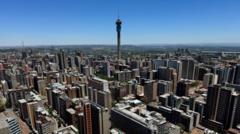Johannesburg once notorious for its crime is witnessing a renaissance marked by the resurgence of iconic structures such as Ponte Tower and innovative development projects.
Johannesburg's Transformation: From Haven of Crime to Urban Renaissance

Johannesburg's Transformation: From Haven of Crime to Urban Renaissance
The city is undergoing a remarkable comeback as efforts to revitalize its neighborhoods gain momentum.
Johannesburg has long struggled with its image as a crime-filled urban environment, particularly exemplified by the infamous Ponte Tower. This once-towering symbol of despair, standing at 200m and built in 1975, was overrun by gangs. Delight Sithole, a tour guide, recounts how the building, filled with trash and danger, represented a dark phase in the city’s history during the 1980s. Both locals and tourists had varied and often horrifying stories tied to the building, making it synonymous with fear.
However, the tides began to turn approximately 15 years ago, thanks to the Fifa World Cup, which sparked renewed interest and occupancy in Ponte Tower, and the post-Covid recovery led to its occupancy drawing close to 75%. Despite ongoing criminal challenges, the city's revitalization efforts are making headway, leaving signs of recovery and progress.
In a recent revelation, the end of severe load-shedding has unveiled a new crisis—a water shortage affecting many neighborhoods. The city also faced a tragic incident in the Central Business District (CBD), where a building fire claimed around 80 lives, exposing the vulnerabilities of hijacked properties—buildings plagued by squatting and criminal control.
Several initiatives are underway to counteract these challenges. One such initiative is driven by Ithemba Properties, a company invested in transforming the CBD by redeveloping areas like Jewel City. Alan Tait, a senior manager at Ithemba, highlights a booming demand for urban living spaces in Johannesburg, projecting substantial growth in their lease agreements.
Moreover, a community-driven initiative, JoziMyJozi, launched various improvement projects. CEO Bea Swanepoel emphasizes the importance of visible progress in restoring civic pride and making the city a safer place for its residents. From illuminating darkened areas to launching comprehensive cleanup efforts to address homelessness and education, there’s an evident transformation in progress.
With the G20 summit set to occur in Johannesburg later this year, the city anticipates an influx of investment and a boost to its global image. Sifiso Zikhali, from Dlala Nje, expresses optimism about the future, noting their success in transforming perceptions and attracting visitors to what was once a site of despair. As Johannesburg continues its journey of transformation, the ambition is to elevate its status alongside global cities like London, Paris, and New York, showcasing resilience amidst challenges.























